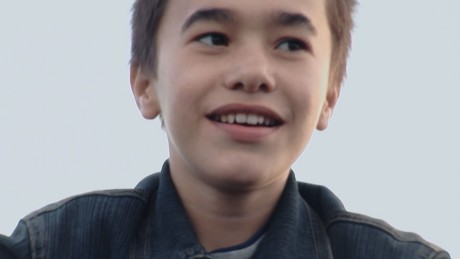


Dmitry Kabakov: Present Simple Tense

Looking down from the sky. Moving over an area with houses accompanied by the director’s voice telling the viewer that this is my place, a kind of brief prologue in a melancholic maybe nostalgic tone. Existential questions raised. And then down to earth, to a smiling happy boy on bike, driving around a town with glimpses of happy gatherings, old women dancing, and driven by lovely energetic music by Evgenyi Kadimsky. It’s a dynamic optimistic start.
The title: ”The simple present tense is when you use a verb (here a film, ed.) to tell about things that happen continually in the present, like every day, every week, or every month. We use the simple present tense for anything that happens often or is factual.”
… explanation for a complicated English title chosen by Russian director Dmitry Kabakov. I met him in Riga a month ago and he sent me a link to this new film by him. Thank you for that, I enjoyed it. Because of the director’s good documentary eye for situations and details in everyday life in his Zvavoronki, where he has lived since he was three years old. Because he takes his time, let scenes stand long and because he has a position:
Fences are built in his town. Around houses, at the railway, at the roads. Borders that separate. Trains that pass by, only some stop. Political refugees from Tajikistan, they don’t speak Russian, meeting slogans on the walls like ”Russia for Russians”. The director takes a lot of time to give a historical background of Tajikistan. Not necessary, what is interesting is the fate of the characters of today.
It’s a big family that is in focus with the boy on the bike, Mukhammad, as the one to be followed from, when he goes with his father “to pick up” a new baby, sibling number 7 and his mother at the hospital till you see him as a fence builder after his Tadjik family has been forced to move away from the house that they had been allowed to stay in by the church in the town.
Between the boy on the bike and the same older boy doing fences you find the film. Next door to the house of the Tadjik family is the green house, where an old couple live. The woman is a teacher and invites in Mukhammad and his sister to be taught languages and mathematics. She is lovely. A strong woman. Her talks with her mostly silent husband are most often about the living conditions of the refugees, she has a true humanistic approach to life and people. The camera catches, no I would say caresses the couple, when they are inside and when they sit on a bench in the garden.
The couple is the director’s parents, he reveals towards the end of the film, you sense that in the tone of the film and in sequences… the father – he does that often – sits in his own thoughts for some time, gets up to take something from the wife’s place in the garden and walks towards the door to the house. Slowly.
The title, “The simple present tense”, is used to tell about things that happen continually in the present, like every day, every week, or every month… that’s what the film does in a very fine way.
Russia/Latvia, 2019, 91 mins.